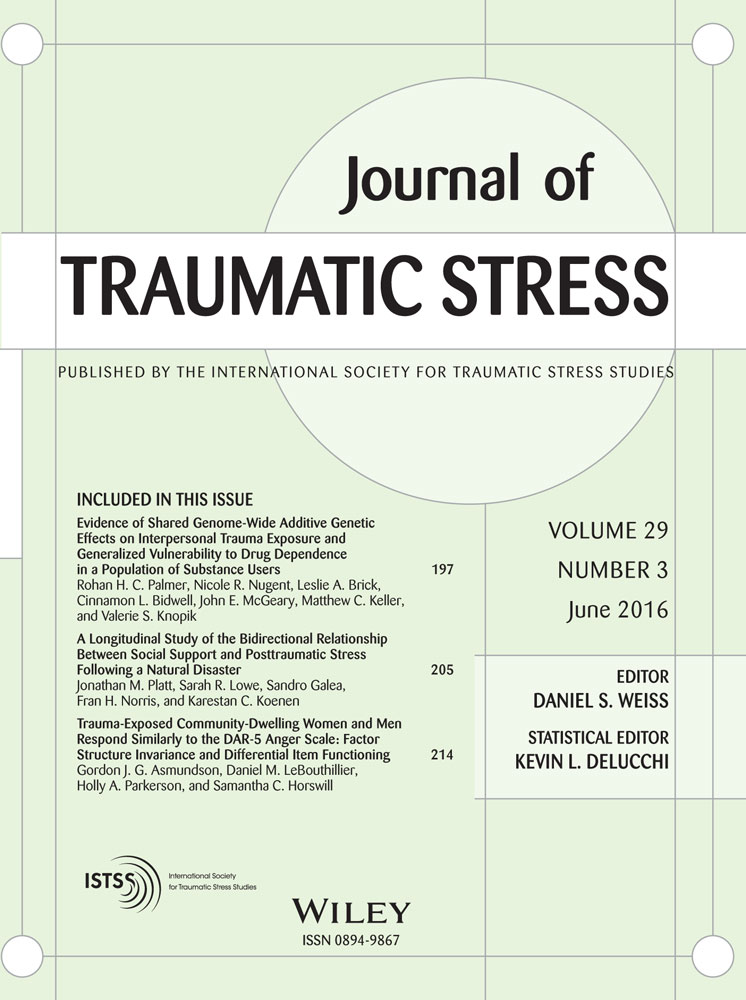An Update on the Clinical Utility of the Children's Post-Traumatic Cognitions Inventory
This work was completed at the Medical Research Council (MRC) Cognition and Brain Sciences Unit (MRC CBU). Professor Dalgleish was supported by the MRC CBU. Dr. Meiser-Stedman, Ms. Dixon, and Dr. McKinnon were supported by an MRC Clinician Scientist Fellowship (G0802821) awarded to Dr. Meiser-Stedman for data collection at the East Anglia site. The London site was funded by an MRC Research Studentship (G78/6730) and a Peggy Pollak Research Fellowship in Developmental Psychiatry by the Psychiatry Research Trust to Dr. Meiser-Stedman. The Australian site was funded by grants from the Channel 7 Research Foundation and the Australian Rotary Health Research Fund awarded to Dr. Nixon.
Abstract
enThe Children's Post-Traumatic Cognitions Inventory (CPTCI) is a self-report questionnaire that measures maladaptive cognitions in children and young people following exposure to trauma. In this study, the psychometric properties of the CPTCI were examined in further detail with the objective of furthering its utility as a clinical tool. Specifically, we investigated the CPTCI's discriminant validity, test-retest reliability, and the potential for the development of a short form of the measure. Three samples (London, East Anglia, Australia) of children and young people exposed to trauma (N = 535; 7–17 years old) completed the CPTCI and a structured clinical interview to measure posttraumatic stress disorder (PTSD) symptoms between 1 and 6 months following trauma. Test-retest reliability was investigated in a subsample of 203 cases. The results showed that a score in the range of 46 to 48 on the CPTCI was indicative of clinically significant appraisals as determined by the presence of PTSD. The measure also had moderate-to-high test-retest reliability (r = .78) over a 2-month period. The Children's Post-Traumatic Cognitions Inventory-Short Form (CPTCI-S) had excellent internal consistency (α = .92), and moderate-to-high test-retest reliability (r = .78). The examination of construct validity showed the model had an excellent fitting factor structure (Comparative Fit index = 0.95, Tucker-Lewis index = 0.91, Root Mean Square Error of Approximation = .07). A score ranging from 16 to 18 was the best cutoff point on the CPTCI-S, in that it was indicative of clinically significant appraisals as determined by the presence of PTSD. Based on these results, we concluded that the CPTCI is a useful tool to support the practice of clinicians and that the CPTCI-S has excellent psychometric properties.
Resumen
esSpanish Abstracts by the Asociación Chilena de Estrés Traumático (ACET)
Utilidad Clínica del CPTCI
El Inventario de Cogniciones postraumáticas para niños (CPTCI, por sus siglas en inglés) es un cuestionario de auto-reporte que mide cogniciones maladaptativas en niños y jóvenes posterior a la exposición a trauma. En este estudio, las propiedades psicométricas del CPTCI se examinaron en detalle con el objetivo de promover su utilidad como una herramienta clínica. Específicamente, investigamos la validez discriminativa del CPTCI, la fiabilidad test-retest, y el potencial para el desarrollo de una forma abreviada del instrumento. Tres muestras (Londres, Anglia del Este, Australia) de niños y jóvenes expuestos a trauma (N: 535; 7–17 años) completaron la CPTCI y una entrevista clínica estructurada para medir síntomas de TEPT entre 1 y 6 meses posteriores al trauma. La fiabilidad test-retest se investigó en un subgrupo de casos. Los resultados que mostraron un puntaje en el rango de 46 y 48 en el CPTCI fueron indicativos de una valoración clínicamente significativa, determinado por la presencia de TEPT. La medida también tuvo fiabilidad test-retest moderada a alta (r: .78) en el curso de un periodo de dos meses. El Inventario de Cogniciones postraumáticas de niños – forma abreviada (CPTCI-S) tuvo una consistencia interna excelente (α: .92), y fiabilidad test-retest moderada a alta. La evaluación de la validez del constructo mostró que el modelo tuvo un factor de estructura ajustado excelente (CFI: 0.95; TLI: 0.91, RMSEA: 0.72). Un puntaje en el rango de 16 y 18 fue el mejor punto de corte en el CPTCI-S indicativo de una valoración clínicamente significativa, determinado por la presencia de TEPT. Basándose en estos resultados, concluimos que el CPTCI es una herramienta útil como apoyo a la práctica de los clínicos y la CPTCI-S tiene propiedades psicométricas excelentes.
抽象
zhTraditional and Simplified Chinese Abstracts by AsianSTSS
An update on the clinical utility of the Children's Posttraumatic Cognitions Inventory
Traditional Chinese
標題: 兒童創傷後認知問卷的臨床治療效用最新研究
撮要: 兒童創傷後認知問卷(CPTCI)是一項自評問卷, 用以測量兒童和青少年經歷創傷後適應不良的認知。本研究將進一步檢視CPTCI的心理測量特性, 旨在發掘其作為臨床治療工具的效用。我們特別檢視CPTCI的判別效度、重測信度以及建立簡單版問卷的可能性。三項(倫敦、東盎格利亞、澳洲)曾經歷創傷的兒童和青少年樣本(N = 535; 7–17歲)在經歷創傷後1至6個月完成CPTCI及結構性臨床面談以測量PTSD症狀。我們並透過一項子樣本去檢視重測信度。研究發現, 在CPTCI取得46至48分便會有臨床顯著的PTSD診斷。研究亦發現這種測量法在兩個月期間有中至高水平的重測信度(r = .78)。兒童創傷後認知問卷(簡單版) (CPTCI-S)有優良的內在一致性(α = .92), 和中至高水平的重測信度(r = .78)。研究亦檢視構念效度, 發現這模型有優良的密合因素結構(CFI = 0.95; TLI = 0.91, RMSEA = .072)。在CPTCI-S取得16至18分是最佳的取錄線, 能反映臨床顯著的PTSD診斷。基於這些發現, 我們總結CPTCI是臨床治療的有效工具, 而CPTCI-S有優良的心理測量特性。
Simplified Chinese
标题: 儿童创伤后认知问卷的临床治疗效用最新研究
撮要: 儿童创伤后认知问卷(CPTCI)是一项自评问卷, 用以测量儿童和青少年经历创伤后适应不良的认知。本研究将进一步检视CPTCI的心理测量特性, 旨在发掘其作为临床治疗工具的效用。我们特别检视CPTCI的判别效度、重测信度以及建立简单版问卷的可能性。三项(伦敦、东盎格利亚、澳洲)曾经历创伤的儿童和青少年样本(N = 535; 7–17岁)在经历创伤后1至6个月完成CPTCI及结构性临床面谈以测量PTSD症状。我们并透过一项子样本去检视重测信度。研究发现, 在CPTCI取得46至48分便会有临床显著的PTSD诊断。研究亦发现这种测量法在两个月期间有中至高水平的重测信度(r = .78)。儿童创伤后认知问卷(简单版) (CPTCI-S)有优良的内在一致性(α = .92), 和中至高水平的重测信度(r = .78)。研究亦检视构念效度, 发现这模型有优良的密合因素结构(CFI = 0.95; TLI = 0.91, RMSEA = .072)。在CPTCI-S取得16至18分是最佳的取录线, 能反映临床显著的PTSD诊断。基于这些发现, 我们总结CPTCI是临床治疗的有效工具, 而CPTCI-S有优良的心理测量特性。




